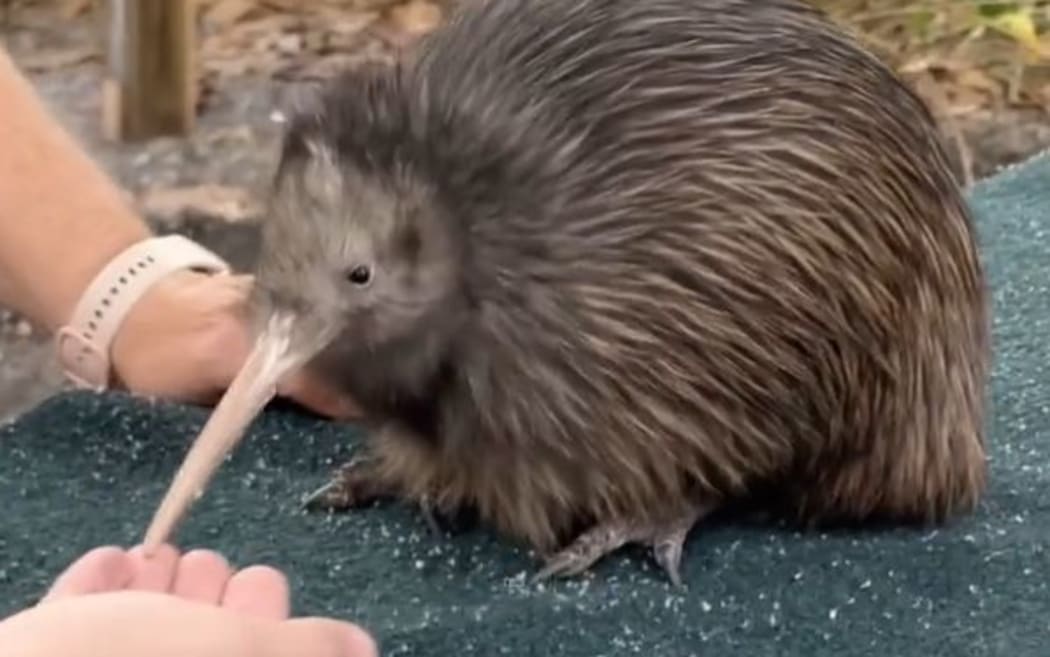When countries send their iconic and precious animals to be cared for overseas, who and what makes sure that they're being cared for appropriately?

Paora is one of 60 kiwi living overseas as part of a government loan scheme. Photo: Twitter / Miami Zoo
A kiwi encounter at an American zoo has caused an outrage, and raised questions about how our taonga species are treated when they go overseas.
But Save the Kiwi executive director Michelle Impey says it's unlikely the missteps made by Zoo Miami in its care of Paora were intentional.
She thinks it was more a case of something "slipping through the cracks".
"You'll never find that it's malicious intent, I think it was an honest misunderstanding of the care of the kiwi," she tells The Detail.
After the backlash, Zoo Miami said it had made a "huge mistake", apologised, and stopped its kiwi encounters.
In New Zealand, Impey says there are "pretty tight standards" for the handling of kiwi, outlined in a best practise manual.
"If there is a special event where kiwi is shown to the public, sometimes if conditions are right you can touch the feathers but it would always be on the bum, so not the face, the head, and the whiskers that kiwi have."
But overseas, the situation is different.
Zoos and other organisations will have their own animal husbandry manuals, and they'll look to what's done in New Zealand for guidance.
There are also organisations, like the World Association of Zoos and Aquariums, that provide assistance and there is an overseas-based species coordinator for kiwi.
"I think the difference there is overseas facilities are spread across three different continents and 16 or 17 different countries, so it's just a little more challenging to physically be there to see the facilities and have eyeballs on [the kiwi]."
Of course, New Zealand's zoos are home to plenty of exotic species – Wellington Zoo welcomed two snow leopards in April.

Wellington's snow leopards, Asha and Manju, weren't born in their native Himalayas. Photo: RNZ / Samuel Rillstone
The zoo partnered with Nepali conservation group Mountain Spirit to ensure the snow leopards, from Melbourne Zoo, are cared for appropriately.
"These are zoo-born animals, they're not from the Himalayas, so they come from a zoo background, but their actual wild line did come from Kyrgyzstan," Wellington Zoo chief executive Karen Fifield says.
"It is about understanding what might be happening with their natural history in the wild, so we can replicate as much as we can here in the zoo.
"But also it's about working with communities and groups, like Mountain Spirit, who are actually doing work day to day to protect these animals in the wild."
The zoo's worked closely with the local Wellington Nepali community to create stories and other content for the animals' enclosure.
"In Nepal ,the snow leopards are called the 'protectors of the mountain', so what we talk about in our interpretive work here at the zoo, we talk about us protecting the protectors, so connecting back to the legends and the stories that come from the Nepali people about the snow leopards."
Like Zoo Miami, Wellington Zoo offers close encounters with animals, but Fifield says rules and guidelines are strictly followed.
"Through our Zoo and Aquarium Association of Australasia, and the World Association of Zoos and Aquariums, we have very clear animal visitor guidelines and these are documents that all members of these associations must sign up to and must also, in terms of their accreditation, provide documentation about how they're actually doing these encounters."
She "won't say never" to something like what happened in Miami happening in New Zealand, but she thinks adherence to the policies here is good.
Hear more about this issue in the full podcast episode.
Check out how to listen to and follow The Detail here.
You can also stay up-to-date by liking us on Facebook or following us on Twitter.

Photo:


